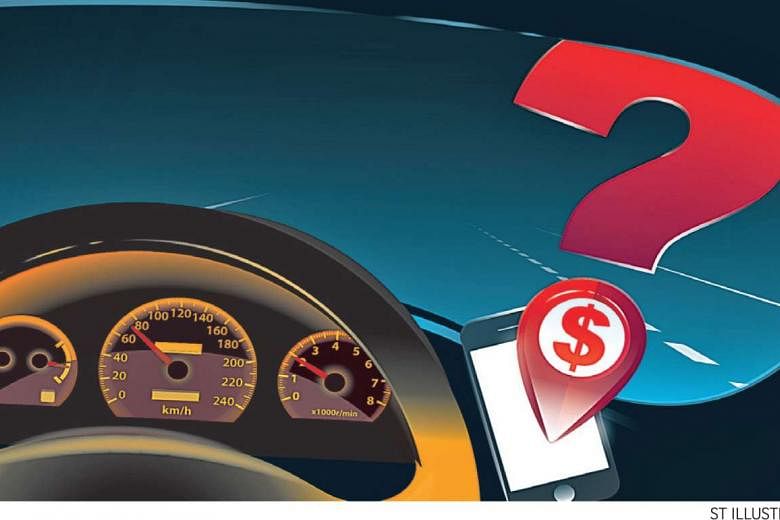Weeks ago, when my colleague and I were sitting in a cab at a stop light, there was this bizarre moment when our taxi driver, who was an old guy, turned to the driver in the car in the left lane - a young guy - and began to orate at him.
The windows were up so he was speaking to us, basically. His point was that young people should not be zipping around as drivers for Uber or Grab - which he deduced this guy was doing - because there's no future in it.
He started driving a taxi because he was old and out of choices, he said. It's not a career. If you take an office job, you can move up to be a supervisor. If you drive a taxi, what do you move up to?
Part-timers, watch out too because once you get used to the idea of a freewheeling cabby, it's hard to launch yourself back into the nine-to-five.
Our driver laboured that point so much you'd think the young man in the other vehicle was making the mistake of his lifetime.

I tried to point out that the trade-off isn't exactly like that. Becoming an Uber driver helps people who otherwise couldn't afford a brand-new car, and everyone likes to have their own ride, even if the plates read "Lion City Rental".
It's an over-simplification to frame young private car hire drivers' decision-making process as a choice between car and career.
But thinking about it that way for a moment made me question whether having more options in this present renaissance of choice necessarily opens up better paths for us all. Generally, is the gig economy viewed positively or negatively in Singapore?
Someone asked this same question at a post-Budget round- table I sat through in February.
SIM University's Walter Theseira ventured a guess that from a government standpoint, the Uberisation of work is viewed very positively, chiefly because it's rescued them from the problem of what to do with underemployed or unemployed people.
Dr Theseira, who volunteers at Meet-the-People Sessions, said deadpan: "The standard operating procedure for many Members of Parliament is when somebody doesn't have a job, they say, 'Oh, why don't you try driving for Uber or Grab?'
"It's become the new taxi-driving option, except it's more flexible."
Nothing wrong with that - it's a lifeline for many people, like the school-canteen operator I once rode with who signed up with Uber because he needed a car to transport his supplies.
And the 48-year-old currency trader charged with cheating who, as Bloomberg wrote, "became a recluse after he was fired from HSBC and had to work as an Uber... driver, his lawyer said".
Different strokes for different folks.
But here's the serious issue, as Dr Theseira put it: "The gig economy provides a small number of high-value jobs, but it also provides a very large number of low-value jobs - and that may possibly cost the economy more than the value created."
Many of the Uber drivers I've met don't look older than 30, which is the minimum age a Singaporean must be to apply for a taxi licence. It's sort of an unspoken rule that when you hop into an Uber, you don't say: "Hello, uncle."
To drive for Uber or Grab, the minimum age is 21.
Before these operators arrived in Singapore, the taxi industry used to be closed to younger people.
The ring-fencing probably helped to nudge them towards more productive roles that could give them a higher income trajectory in the long term - something that part-time work and so-called gig-economy jobs cannot guarantee.
So even as we look to the "disruptors" for more creative wisdom to live by, it's worth noting that part of Uber's success is also made possible by ordinary regulatory liberalisation, which is not such a bold feat.
Singapore's is still a fledgling gig economy, and only time will tell who are its winners and losers.
The top people at Grab and Uber are not freelancers. I don't plan to be a gig worker, if I can help it.
Most people are familiar with the perils of falling outside formal employment law and the social security argument. These issues are part of the discourse because it's fair game to lobby employers to internalise these costs.
What's discussed less often are the very personal implications that the Government cannot possibly assist you with.
These include your income trajectory, or the perceptions you will have to fight against when the recruiter frowns at the two-year experience gap in your resume which was your capitulation to the call of "self-employment" and "flexi-work hours" .
In the long term, the flexibility you really want to have is career flexibility. We have it to begin with, when we are young.
The challenge is what you do with it. And that's partly about being honest with your ambition and sticking with it, vague though it may seem now.
I agree it's hard to set and keep long-term goals. What I try to do is keep things simple. No need to see your whole life in 10 years but make it a habit to think ahead, two steps ahead in the decisions you make.
I also try to sharpen my reasoning and decision-making skills by reading widely, keeping myself informed and learning to take positions on various issues.
Forming opinions and taking sides in a grey world trains me to articulate my thoughts, and move towards self-knowledge.
With clarity, we won't be easily waylaid by other people's notions or dazzled silly by burgeoning choice.


